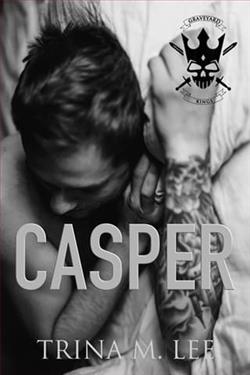Page 17 of Needs Must
Cal nodded. ‘True enough.’
Cal’s butler tapped at the door and announced Bagshott’s arrival. Metcalf, who was very socially aware, showed no emotion, but Cal knew that his butler would not approve of Bagshott’s appearance. Standards had to be maintained; a mantra which Cal often thought was more assiduously adhered to below stairs than above them. Speculation would be rife in the servants’ hall regarding the emergence of their reclusive nearest neighbour, but Metcalf would stamp down on the gossip. He ran an exceedingly tight ship and Cal’s household was seamlessly managed as a consequence.
‘Show him in, Metcalf,’ Cal said, standing and slipping his arms into his discarded coat. A coat that had been ruinously expensive and was the last word in fashion. He wondered if Bagshott would notice, or even care.
‘Bagshott.’
Cal extended a hand, hiding his surprise at the man’s appearance, despite the fact that he had been warned to expect it. Bagshott’s face was weathered, an undulating landscape of wrinkles, folds and blotches that had no place on the features of a comparatively young man. His whiskers were streaked with grey, as was his hair. He couldn’t have been more than forty, but he looked closer to sixty. His stance, though, was upright and muscular, his expression fiercely determined. He was a man well accustomed to hard work, Cal figured, wondering why he felt the need to do his own labouring. Perhaps the upcoming interview would shed some light on a situation that Cal now found mildly intriguing.
‘My friend, Julius Hardy.’
Jules stepped forward, his hand outstretched. Bagshott’s grasp was firm, Cal already knew, watching him as his shrewd eyes took in his surroundings.
‘Good of you to receive me,’ he said in a gruff voice.
Cal indicated the chair in front of his desk and resumed his own. Jules sat a little back from them and would, Cal knew, keep a weather eye on proceedings, contributing to the conversation only when necessary.
‘What can I do for you?’ Cal asked, seeing no reason to beat around the bush.
‘It’s the woods that separate our estates,’ Bagshott replied. ‘They need fencing off.’
Cal raised a brow, unimpressed by the man’s dictatorial tone. ‘Fencing off from what?’
‘From poachers, obviously.’ Bagshott tutted impatiently, as though the question hadn’t been worth voicing. ‘They’re a plague, and something has to be done to stop them.’
‘They will never be stopped,’ Cal replied, leaning back in his chair and crossing one foot over his opposite thigh, pulling rank through his languid pose.
Cal’s first impression of Bagshott was not favourable. He appeared to think that he could get away with calling the shots and Cal had no intention of allowing that supposition to endure. He thought of Mrs Harte living in this man’s cottage and suppressed a shudder. There was an aura about him that made Cal wary, and he did not scare easily.
It was his eyes, Cal decided. They were narrow, mean and calculating. He was a recluse, Cal reminded himself, and therefore his path was unlikely to cross Mrs Harte’s. Even so, Cal felt fiercely protective towards his new neighbour.
His reaction disturbed him. If he was honest with himself, he would be obliged to concede that the enigmatic Mrs Harte had not been out of his thoughts since their accidental meeting the previous day. She was a refreshing change from the helpless misses whose company he was ordinarily obliged to endure. She was forthright in the expression of her views yet secretive and, he was now absolutely convinced, in urgent need of help.
Help that someone in Cal’s position would easily be able to provide her with. Getting her to open up to him and ask for it would be a delightful challenge, the thought of which energised Cal in ways that he had forgotten were possible.
‘Men who have no work and no means of feeding their families are desperate enough to risk the consequences, no matter what we might do to try and prevent them,’ Cal pointed out, returning to the subject of poaching. ‘And I have some sympathy with their situation.’
‘Pah!’ Bagshott waved that suggestion aside as though swatting an irksome fly, his reaction bordering on insolence. ‘There is work to be found for those that genuinely need employment.’
Cal shook his head, astounded by the extent of the man’s hubris. ‘Then I suggest you lead by example, as men in your position have a duty to, and employ more keepers to patrol your estate at night,’ he said curtly. ‘That will help to curb the poaching epidemic that appears to be plaguing your wildlife.’
‘I don’t want strangers traipsing all over my land. The keepers are sometimes as bad as the poachers, turning a blind eye and even letting their friends onto the estates they are paid to protect.’
‘Really?’ Cal arched a brow. ‘I cannot say that I have had that experience myself.’
‘Your estate is vast.’ Bagshott leaned forward, his disconcerting eyes sending Cal a malicious challenge. ‘How can you possibly be so sure?’
Cal had had enough of his ascetic neighbour’s temerity in challenging his management style. His foot hit the floor with a resounding thud as he removed it from his thigh and sat forward, meeting Bagshott’s audacious stare with an intimidating glower of his own that caused his visitor to lower his gaze first. It was, Cal suspected, the first occasion in a very long time that anyone had stared him down.
‘I fail to understand why you are here,’ Cal said, sitting back in his chair, his tone moderate. Dismissive even. ‘You are fortunate to have been received, given the problems you created when you closed that track.’
‘It is onmyland and I didn’t want my privacy invaded,’ Bagshott said gruffly.
‘Even so, have the goodness to get to the point.’
‘How many keepers do you employ, as a matter of interest?’ Jules asked, speaking for the first time.
Bagshott’s body jerked upright as he turned to look at Jules, clearly debating whether to tell him to mind his own business. Prudence won the day. ‘Just two,’ he grunted.















